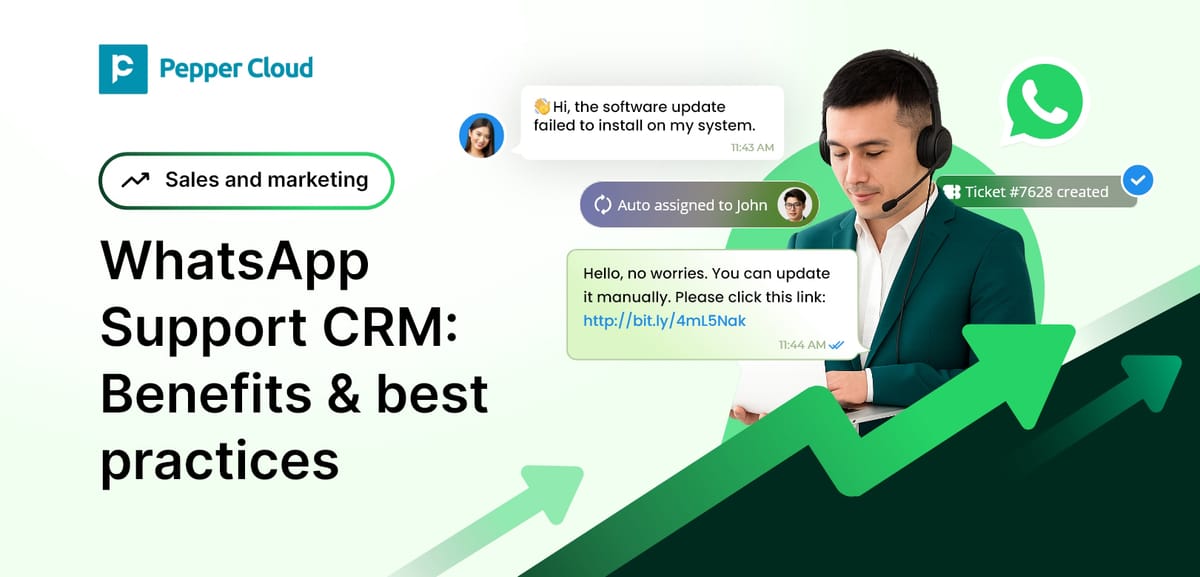Why WhatsApp CRM is the future of customer engagement
Discover why WhatsApp CRM for customer support is transforming customer service with instant, personalised engagement. Explore features, AI, and future trends.

The way customers interact with businesses has shifted dramatically. No longer content with waiting days for an email reply or queuing on phone lines, customers now expect instant, human-like conversations. WhatsApp, with its global reach and real-time messaging, has become the platform where these expectations are most naturally met.
WhatsApp CRM for customer support marks a new era of customer engagement, blending convenience, personalisation, and efficiency.
By integrating WhatsApp into customer relationship management (CRM) systems, businesses can deliver the kind of communication today’s customers crave: fast, friendly, and frictionless. In this blog, we’ll explore why WhatsApp CRM for customer service is revolutionising engagement and why it will soon be a standard tool for businesses worldwide.
WhatsApp CRM Vs traditional CRM
Traditional CRMs were built in a time when customer service revolved around email and phone. While effective for record-keeping and structured workflows, they often fall short in meeting today’s demand for immediacy and personalisation. Customers increasingly view emails as slow and formal, while long call centre wait times erode brand trust.
By contrast, WhatsApp CRM for support transforms customer interactions into real-time, conversational experiences. Messages are read and responded to quickly, and customers can chat just as they do with friends and family. The accessibility of WhatsApp means customers no longer have to log in to portals or wait on hold—they can engage with brands directly through an app they already use daily.
This instant, two-way dialogue makes WhatsApp CRM more than just a channel. It is a shift towards meaningful, personalised conversations that feel natural, rather than transactional.
Customer engagement on WhatsApp
With over two billion active users globally, WhatsApp has become a central part of daily communication. For businesses, this creates an unparalleled opportunity for engagement. Customers are more likely to respond to a WhatsApp message than to an email buried in their inbox.
Imagine a retail brand confirming an order with a WhatsApp notification, then instantly answering a follow-up question about delivery. Or a travel company sending real-time boarding updates and personalised itinerary support. These interactions build trust, loyalty, and satisfaction.
Through customer service on WhatsApp, businesses can foster conversations that feel more human. The app’s multimedia capabilities—images, videos, voice notes—further enrich engagement, creating interactive experiences that go beyond text.

What features make WhatsApp CRM the future of customer engagement?
Several key features of WhatsApp CRM highlight why it is fast becoming the backbone of modern customer engagement:
- Automation: Predefined replies and workflows ensure customers get instant answers to common queries.
- Chat history and profiles: Support agents can view conversation histories alongside customer details, ensuring personalised responses.
- Bulk messaging: Ideal for updates, promotions, or announcements, all delivered in a non-intrusive way.
- Template messages: Pre-approved messages help maintain compliance while improving efficiency.
- Integration with other tools: Seamless connections with existing systems mean businesses can manage tickets, create tasks, track escalations, and measure performance centrally.
Together, these features allow teams to respond faster and smarter. They don’t just improve customer satisfaction—they empower businesses to scale support without losing the personal touch.
CRM for customer service on WhatsApp
As customer expectations evolve, businesses are increasingly shifting towards CRM for customer service on WhatsApp. Unlike fragmented approaches, WhatsApp CRM centralises communication, ensuring every interaction is trackable and measurable.
Support teams can assign tickets, escalate issues, and monitor response times—all within WhatsApp CRM dashboards. This makes WhatsApp CRM for customer support both scalable and reliable. Managers gain visibility into customer interactions, while agents benefit from an intuitive interface that keeps conversations flowing smoothly.
For industries such as e-commerce, travel, and financial services, where customer queries are time-sensitive, WhatsApp CRM has become a critical support solution.
What role will AI play in the future of WhatsApp CRM?
Artificial intelligence is already shaping customer engagement, and its role in WhatsApp CRM is only set to grow. AI-powered chatbots can handle routine queries around the clock, such as FAQs or order updates, freeing human agents for more complex tasks.
Looking ahead, AI will enable predictive support—anticipating customer needs before they arise. For example, a telecom company could proactively send solutions when it detects a service issue in a customer’s area. Sentiment analysis, another AI-driven feature, will allow businesses to gauge customer emotions in real time and tailor responses accordingly.
It’s important to note that AI won’t replace human agents. Instead, it will augment their capabilities, ensuring conversations are efficient yet empathetic. This hybrid approach will be the hallmark of WhatsApp CRM for customer service in the future.
Future of customer engagement with WhatsApp CRM
The future of customer engagement lies in hyper-personalisation, instant support, and seamless omnichannel integration. WhatsApp CRM is uniquely positioned to deliver on all three.
- Hyper-personalisation: Every customer interaction can be tailored using past data, preferences, and conversational history.
- Instant support: Customers get quick resolutions, reducing frustration and building loyalty.
- Omnichannel integration: WhatsApp CRM connects with email, social media, and other support channels, creating a unified customer journey.
As more businesses adopt customer service on WhatsApp, customers will come to expect it as the norm. Those that embrace it early will gain a competitive edge, while laggards risk being perceived as outdated and unresponsive.
Conclusion
Customer expectations are evolving rapidly, and businesses must adapt to remain competitive. WhatsApp CRM for customer support is not just a tool—it’s a strategic necessity. By enabling instant, conversational, and personalised interactions, WhatsApp CRM bridges the gap between businesses and their customers.
From automation and AI integration to seamless ticketing and analytics, WhatsApp CRM provides everything modern businesses need to deliver exceptional experiences. The message is clear: the future of customer engagement with WhatsApp CRM is already here. Those who embrace it will lead the way in building stronger, more meaningful relationships with their customers.





